PROJMGNT 7012: EPC and EPCM Contractual Agreement Report
VerifiedAdded on 2022/12/30
|12
|3836
|1
Report
AI Summary
This report analyzes EPC (Engineering, Procurement, and Construction) and EPCM (Engineering, Procurement, Construction, and Management) contractual agreements, comparing their key differences and outlining their respective advantages and disadvantages. The report begins by defining both contract types, highlighting the EPC's single-point responsibility and lump-sum nature versus the EPCM's focus on professional services and management. It then contrasts the two approaches across various parameters, including equipment supply warranties, project budget risks, project financing, performance risk, timely performance measurement, performance incentives, project completion schedule criticality, construction work packaging, communication of construction issues, material supply cycle, and benefits of innovation and efficiencies, as well as accountability for labor relations. The advantages of EPC contracts include integrated team involvement, risk transfer, and high delivery standards, while disadvantages may include limited owner participation and potential contractor inefficiency. EPCM contracts, on the other hand, may offer flexibility but can involve complexities in risk sharing. The report concludes with recommendations for the organization regarding the selection of the most suitable contract type based on its specific project needs and priorities, considering factors such as risk tolerance, project scope definition, and desired level of owner involvement.
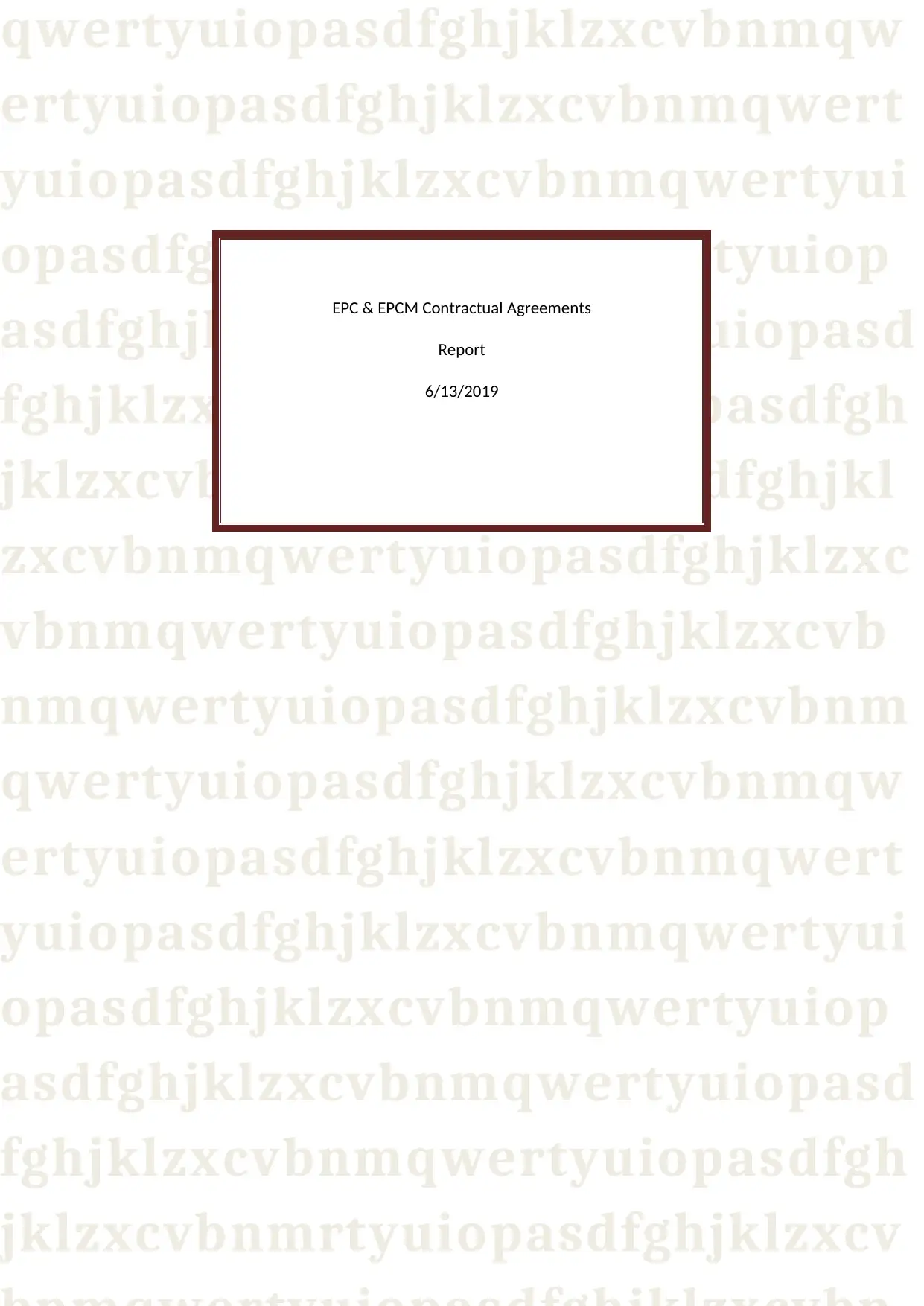
qwertyuiopasdfghjklzxcvbnmqw
ertyuiopasdfghjklzxcvbnmqwert
yuiopasdfghjklzxcvbnmqwertyui
opasdfghjklzxcvbnmqwertyuiop
asdfghjklzxcvbnmqwertyuiopasd
fghjklzxcvbnmqwertyuiopasdfgh
jklzxcvbnmqwertyuiopasdfghjkl
zxcvbnmqwertyuiopasdfghjklzxc
vbnmqwertyuiopasdfghjklzxcvb
nmqwertyuiopasdfghjklzxcvbnm
qwertyuiopasdfghjklzxcvbnmqw
ertyuiopasdfghjklzxcvbnmqwert
yuiopasdfghjklzxcvbnmqwertyui
opasdfghjklzxcvbnmqwertyuiop
asdfghjklzxcvbnmqwertyuiopasd
fghjklzxcvbnmqwertyuiopasdfgh
jklzxcvbnmrtyuiopasdfghjklzxcv
EPC & EPCM Contractual Agreements
Report
6/13/2019
ertyuiopasdfghjklzxcvbnmqwert
yuiopasdfghjklzxcvbnmqwertyui
opasdfghjklzxcvbnmqwertyuiop
asdfghjklzxcvbnmqwertyuiopasd
fghjklzxcvbnmqwertyuiopasdfgh
jklzxcvbnmqwertyuiopasdfghjkl
zxcvbnmqwertyuiopasdfghjklzxc
vbnmqwertyuiopasdfghjklzxcvb
nmqwertyuiopasdfghjklzxcvbnm
qwertyuiopasdfghjklzxcvbnmqw
ertyuiopasdfghjklzxcvbnmqwert
yuiopasdfghjklzxcvbnmqwertyui
opasdfghjklzxcvbnmqwertyuiop
asdfghjklzxcvbnmqwertyuiopasd
fghjklzxcvbnmqwertyuiopasdfgh
jklzxcvbnmrtyuiopasdfghjklzxcv
EPC & EPCM Contractual Agreements
Report
6/13/2019
Paraphrase This Document
Need a fresh take? Get an instant paraphrase of this document with our AI Paraphraser
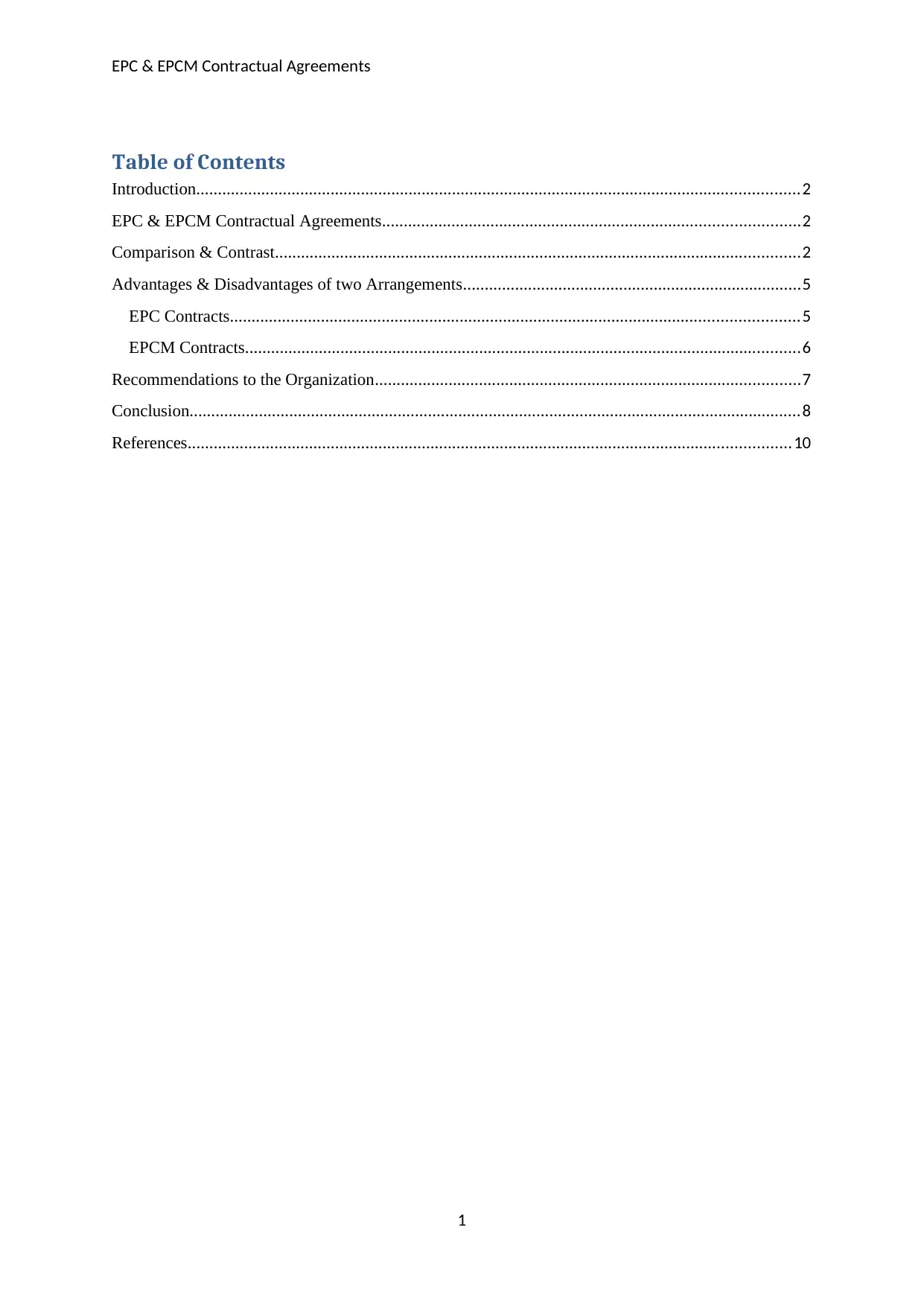
EPC & EPCM Contractual Agreements
Table of Contents
Introduction...........................................................................................................................................2
EPC & EPCM Contractual Agreements................................................................................................2
Comparison & Contrast.........................................................................................................................2
Advantages & Disadvantages of two Arrangements..............................................................................5
EPC Contracts...................................................................................................................................5
EPCM Contracts................................................................................................................................6
Recommendations to the Organization..................................................................................................7
Conclusion.............................................................................................................................................8
References...........................................................................................................................................10
1
Table of Contents
Introduction...........................................................................................................................................2
EPC & EPCM Contractual Agreements................................................................................................2
Comparison & Contrast.........................................................................................................................2
Advantages & Disadvantages of two Arrangements..............................................................................5
EPC Contracts...................................................................................................................................5
EPCM Contracts................................................................................................................................6
Recommendations to the Organization..................................................................................................7
Conclusion.............................................................................................................................................8
References...........................................................................................................................................10
1
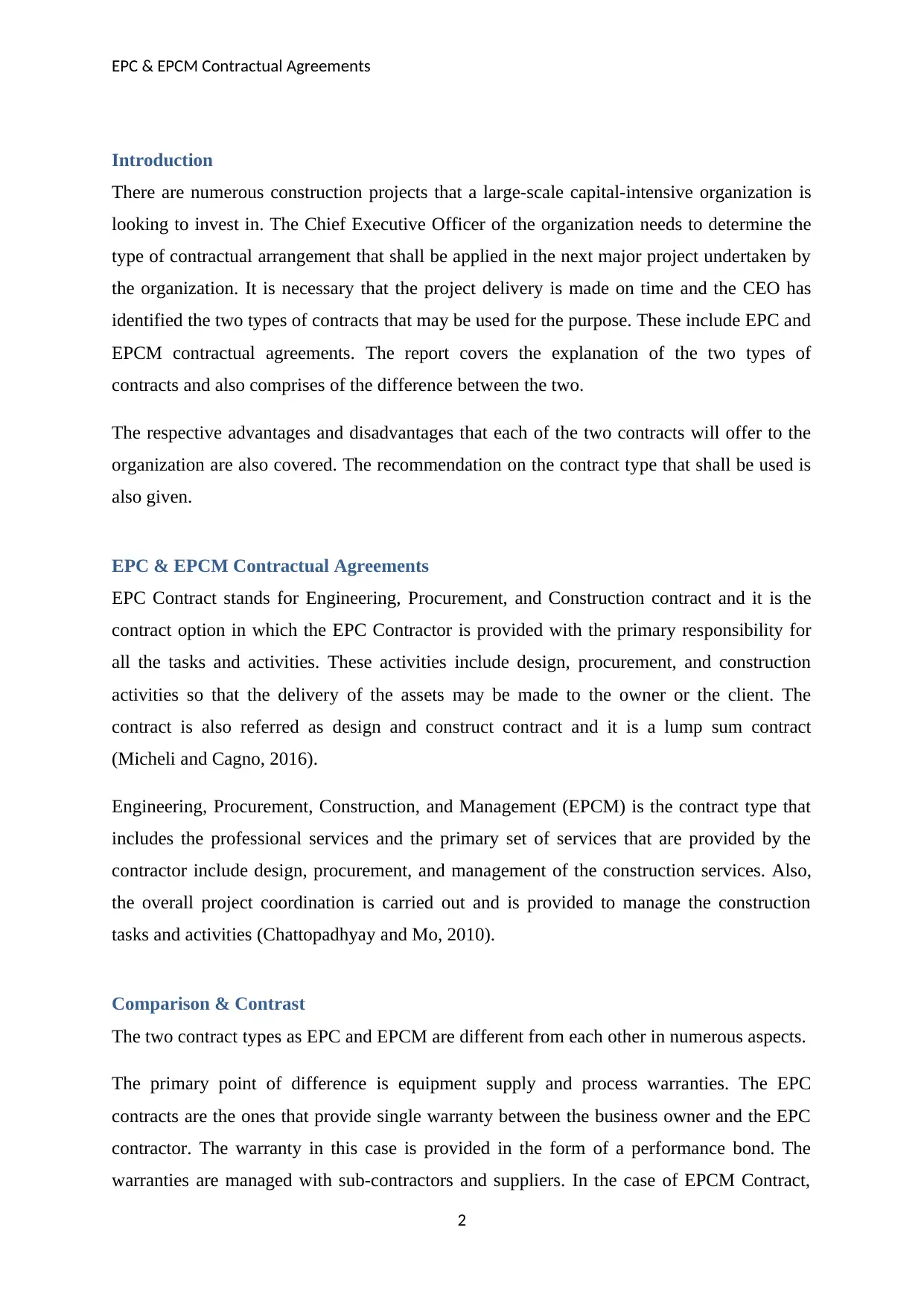
EPC & EPCM Contractual Agreements
Introduction
There are numerous construction projects that a large-scale capital-intensive organization is
looking to invest in. The Chief Executive Officer of the organization needs to determine the
type of contractual arrangement that shall be applied in the next major project undertaken by
the organization. It is necessary that the project delivery is made on time and the CEO has
identified the two types of contracts that may be used for the purpose. These include EPC and
EPCM contractual agreements. The report covers the explanation of the two types of
contracts and also comprises of the difference between the two.
The respective advantages and disadvantages that each of the two contracts will offer to the
organization are also covered. The recommendation on the contract type that shall be used is
also given.
EPC & EPCM Contractual Agreements
EPC Contract stands for Engineering, Procurement, and Construction contract and it is the
contract option in which the EPC Contractor is provided with the primary responsibility for
all the tasks and activities. These activities include design, procurement, and construction
activities so that the delivery of the assets may be made to the owner or the client. The
contract is also referred as design and construct contract and it is a lump sum contract
(Micheli and Cagno, 2016).
Engineering, Procurement, Construction, and Management (EPCM) is the contract type that
includes the professional services and the primary set of services that are provided by the
contractor include design, procurement, and management of the construction services. Also,
the overall project coordination is carried out and is provided to manage the construction
tasks and activities (Chattopadhyay and Mo, 2010).
Comparison & Contrast
The two contract types as EPC and EPCM are different from each other in numerous aspects.
The primary point of difference is equipment supply and process warranties. The EPC
contracts are the ones that provide single warranty between the business owner and the EPC
contractor. The warranty in this case is provided in the form of a performance bond. The
warranties are managed with sub-contractors and suppliers. In the case of EPCM Contract,
2
Introduction
There are numerous construction projects that a large-scale capital-intensive organization is
looking to invest in. The Chief Executive Officer of the organization needs to determine the
type of contractual arrangement that shall be applied in the next major project undertaken by
the organization. It is necessary that the project delivery is made on time and the CEO has
identified the two types of contracts that may be used for the purpose. These include EPC and
EPCM contractual agreements. The report covers the explanation of the two types of
contracts and also comprises of the difference between the two.
The respective advantages and disadvantages that each of the two contracts will offer to the
organization are also covered. The recommendation on the contract type that shall be used is
also given.
EPC & EPCM Contractual Agreements
EPC Contract stands for Engineering, Procurement, and Construction contract and it is the
contract option in which the EPC Contractor is provided with the primary responsibility for
all the tasks and activities. These activities include design, procurement, and construction
activities so that the delivery of the assets may be made to the owner or the client. The
contract is also referred as design and construct contract and it is a lump sum contract
(Micheli and Cagno, 2016).
Engineering, Procurement, Construction, and Management (EPCM) is the contract type that
includes the professional services and the primary set of services that are provided by the
contractor include design, procurement, and management of the construction services. Also,
the overall project coordination is carried out and is provided to manage the construction
tasks and activities (Chattopadhyay and Mo, 2010).
Comparison & Contrast
The two contract types as EPC and EPCM are different from each other in numerous aspects.
The primary point of difference is equipment supply and process warranties. The EPC
contracts are the ones that provide single warranty between the business owner and the EPC
contractor. The warranty in this case is provided in the form of a performance bond. The
warranties are managed with sub-contractors and suppliers. In the case of EPCM Contract,
2
⊘ This is a preview!⊘
Do you want full access?
Subscribe today to unlock all pages.

Trusted by 1+ million students worldwide
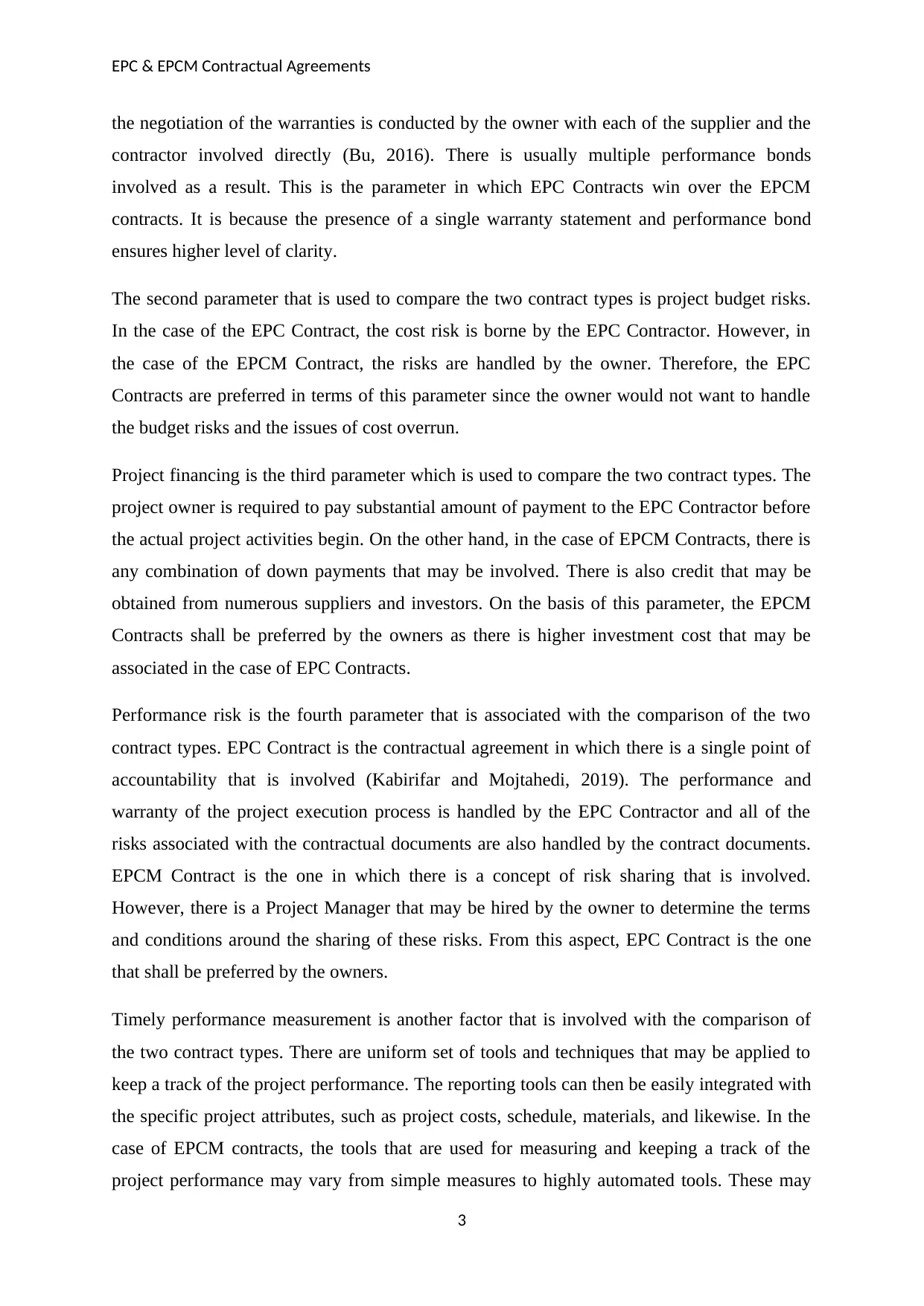
EPC & EPCM Contractual Agreements
the negotiation of the warranties is conducted by the owner with each of the supplier and the
contractor involved directly (Bu, 2016). There is usually multiple performance bonds
involved as a result. This is the parameter in which EPC Contracts win over the EPCM
contracts. It is because the presence of a single warranty statement and performance bond
ensures higher level of clarity.
The second parameter that is used to compare the two contract types is project budget risks.
In the case of the EPC Contract, the cost risk is borne by the EPC Contractor. However, in
the case of the EPCM Contract, the risks are handled by the owner. Therefore, the EPC
Contracts are preferred in terms of this parameter since the owner would not want to handle
the budget risks and the issues of cost overrun.
Project financing is the third parameter which is used to compare the two contract types. The
project owner is required to pay substantial amount of payment to the EPC Contractor before
the actual project activities begin. On the other hand, in the case of EPCM Contracts, there is
any combination of down payments that may be involved. There is also credit that may be
obtained from numerous suppliers and investors. On the basis of this parameter, the EPCM
Contracts shall be preferred by the owners as there is higher investment cost that may be
associated in the case of EPC Contracts.
Performance risk is the fourth parameter that is associated with the comparison of the two
contract types. EPC Contract is the contractual agreement in which there is a single point of
accountability that is involved (Kabirifar and Mojtahedi, 2019). The performance and
warranty of the project execution process is handled by the EPC Contractor and all of the
risks associated with the contractual documents are also handled by the contract documents.
EPCM Contract is the one in which there is a concept of risk sharing that is involved.
However, there is a Project Manager that may be hired by the owner to determine the terms
and conditions around the sharing of these risks. From this aspect, EPC Contract is the one
that shall be preferred by the owners.
Timely performance measurement is another factor that is involved with the comparison of
the two contract types. There are uniform set of tools and techniques that may be applied to
keep a track of the project performance. The reporting tools can then be easily integrated with
the specific project attributes, such as project costs, schedule, materials, and likewise. In the
case of EPCM contracts, the tools that are used for measuring and keeping a track of the
project performance may vary from simple measures to highly automated tools. These may
3
the negotiation of the warranties is conducted by the owner with each of the supplier and the
contractor involved directly (Bu, 2016). There is usually multiple performance bonds
involved as a result. This is the parameter in which EPC Contracts win over the EPCM
contracts. It is because the presence of a single warranty statement and performance bond
ensures higher level of clarity.
The second parameter that is used to compare the two contract types is project budget risks.
In the case of the EPC Contract, the cost risk is borne by the EPC Contractor. However, in
the case of the EPCM Contract, the risks are handled by the owner. Therefore, the EPC
Contracts are preferred in terms of this parameter since the owner would not want to handle
the budget risks and the issues of cost overrun.
Project financing is the third parameter which is used to compare the two contract types. The
project owner is required to pay substantial amount of payment to the EPC Contractor before
the actual project activities begin. On the other hand, in the case of EPCM Contracts, there is
any combination of down payments that may be involved. There is also credit that may be
obtained from numerous suppliers and investors. On the basis of this parameter, the EPCM
Contracts shall be preferred by the owners as there is higher investment cost that may be
associated in the case of EPC Contracts.
Performance risk is the fourth parameter that is associated with the comparison of the two
contract types. EPC Contract is the contractual agreement in which there is a single point of
accountability that is involved (Kabirifar and Mojtahedi, 2019). The performance and
warranty of the project execution process is handled by the EPC Contractor and all of the
risks associated with the contractual documents are also handled by the contract documents.
EPCM Contract is the one in which there is a concept of risk sharing that is involved.
However, there is a Project Manager that may be hired by the owner to determine the terms
and conditions around the sharing of these risks. From this aspect, EPC Contract is the one
that shall be preferred by the owners.
Timely performance measurement is another factor that is involved with the comparison of
the two contract types. There are uniform set of tools and techniques that may be applied to
keep a track of the project performance. The reporting tools can then be easily integrated with
the specific project attributes, such as project costs, schedule, materials, and likewise. In the
case of EPCM contracts, the tools that are used for measuring and keeping a track of the
project performance may vary from simple measures to highly automated tools. These may
3
Paraphrase This Document
Need a fresh take? Get an instant paraphrase of this document with our AI Paraphraser
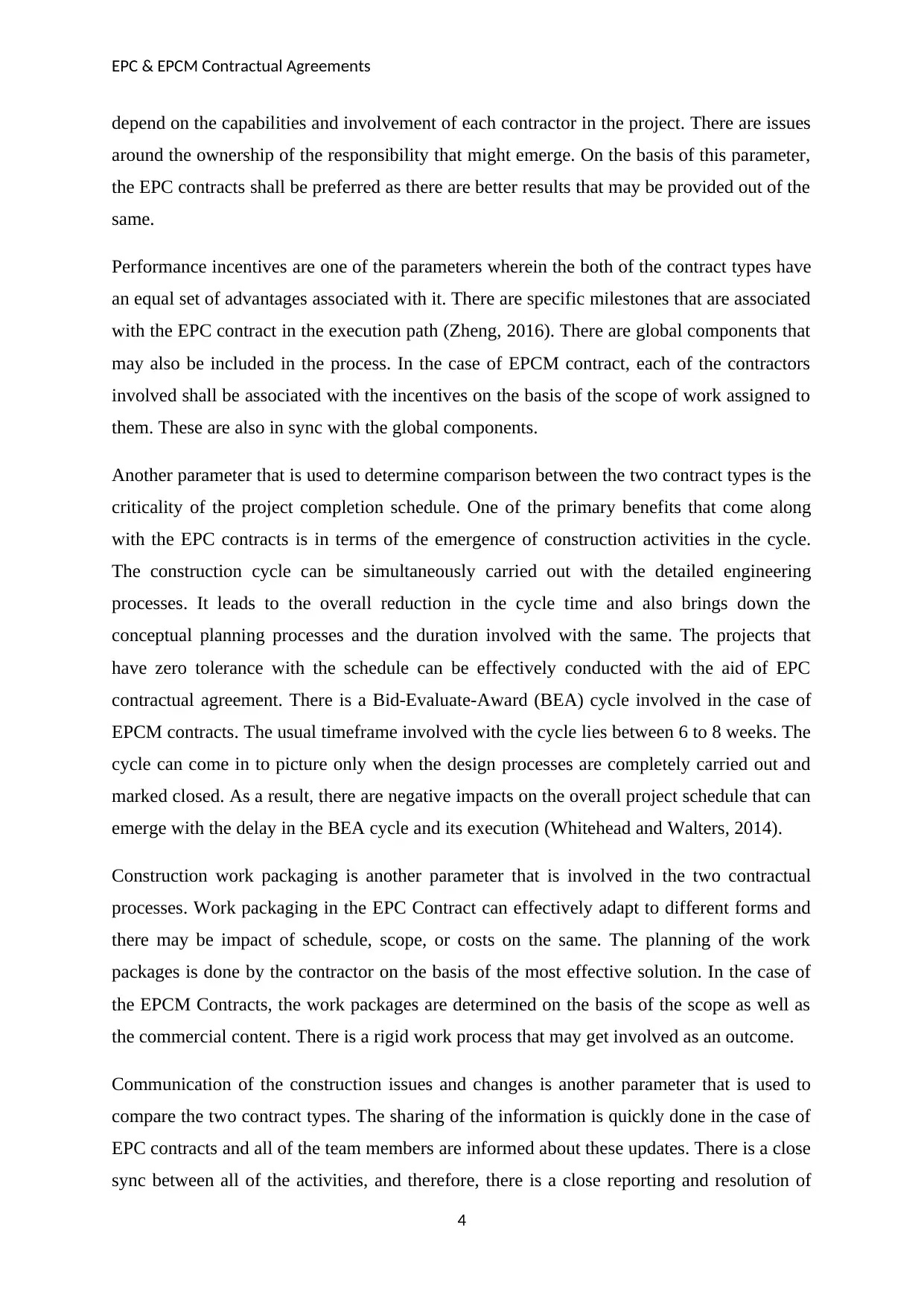
EPC & EPCM Contractual Agreements
depend on the capabilities and involvement of each contractor in the project. There are issues
around the ownership of the responsibility that might emerge. On the basis of this parameter,
the EPC contracts shall be preferred as there are better results that may be provided out of the
same.
Performance incentives are one of the parameters wherein the both of the contract types have
an equal set of advantages associated with it. There are specific milestones that are associated
with the EPC contract in the execution path (Zheng, 2016). There are global components that
may also be included in the process. In the case of EPCM contract, each of the contractors
involved shall be associated with the incentives on the basis of the scope of work assigned to
them. These are also in sync with the global components.
Another parameter that is used to determine comparison between the two contract types is the
criticality of the project completion schedule. One of the primary benefits that come along
with the EPC contracts is in terms of the emergence of construction activities in the cycle.
The construction cycle can be simultaneously carried out with the detailed engineering
processes. It leads to the overall reduction in the cycle time and also brings down the
conceptual planning processes and the duration involved with the same. The projects that
have zero tolerance with the schedule can be effectively conducted with the aid of EPC
contractual agreement. There is a Bid-Evaluate-Award (BEA) cycle involved in the case of
EPCM contracts. The usual timeframe involved with the cycle lies between 6 to 8 weeks. The
cycle can come in to picture only when the design processes are completely carried out and
marked closed. As a result, there are negative impacts on the overall project schedule that can
emerge with the delay in the BEA cycle and its execution (Whitehead and Walters, 2014).
Construction work packaging is another parameter that is involved in the two contractual
processes. Work packaging in the EPC Contract can effectively adapt to different forms and
there may be impact of schedule, scope, or costs on the same. The planning of the work
packages is done by the contractor on the basis of the most effective solution. In the case of
the EPCM Contracts, the work packages are determined on the basis of the scope as well as
the commercial content. There is a rigid work process that may get involved as an outcome.
Communication of the construction issues and changes is another parameter that is used to
compare the two contract types. The sharing of the information is quickly done in the case of
EPC contracts and all of the team members are informed about these updates. There is a close
sync between all of the activities, and therefore, there is a close reporting and resolution of
4
depend on the capabilities and involvement of each contractor in the project. There are issues
around the ownership of the responsibility that might emerge. On the basis of this parameter,
the EPC contracts shall be preferred as there are better results that may be provided out of the
same.
Performance incentives are one of the parameters wherein the both of the contract types have
an equal set of advantages associated with it. There are specific milestones that are associated
with the EPC contract in the execution path (Zheng, 2016). There are global components that
may also be included in the process. In the case of EPCM contract, each of the contractors
involved shall be associated with the incentives on the basis of the scope of work assigned to
them. These are also in sync with the global components.
Another parameter that is used to determine comparison between the two contract types is the
criticality of the project completion schedule. One of the primary benefits that come along
with the EPC contracts is in terms of the emergence of construction activities in the cycle.
The construction cycle can be simultaneously carried out with the detailed engineering
processes. It leads to the overall reduction in the cycle time and also brings down the
conceptual planning processes and the duration involved with the same. The projects that
have zero tolerance with the schedule can be effectively conducted with the aid of EPC
contractual agreement. There is a Bid-Evaluate-Award (BEA) cycle involved in the case of
EPCM contracts. The usual timeframe involved with the cycle lies between 6 to 8 weeks. The
cycle can come in to picture only when the design processes are completely carried out and
marked closed. As a result, there are negative impacts on the overall project schedule that can
emerge with the delay in the BEA cycle and its execution (Whitehead and Walters, 2014).
Construction work packaging is another parameter that is involved in the two contractual
processes. Work packaging in the EPC Contract can effectively adapt to different forms and
there may be impact of schedule, scope, or costs on the same. The planning of the work
packages is done by the contractor on the basis of the most effective solution. In the case of
the EPCM Contracts, the work packages are determined on the basis of the scope as well as
the commercial content. There is a rigid work process that may get involved as an outcome.
Communication of the construction issues and changes is another parameter that is used to
compare the two contract types. The sharing of the information is quickly done in the case of
EPC contracts and all of the team members are informed about these updates. There is a close
sync between all of the activities, and therefore, there is a close reporting and resolution of
4
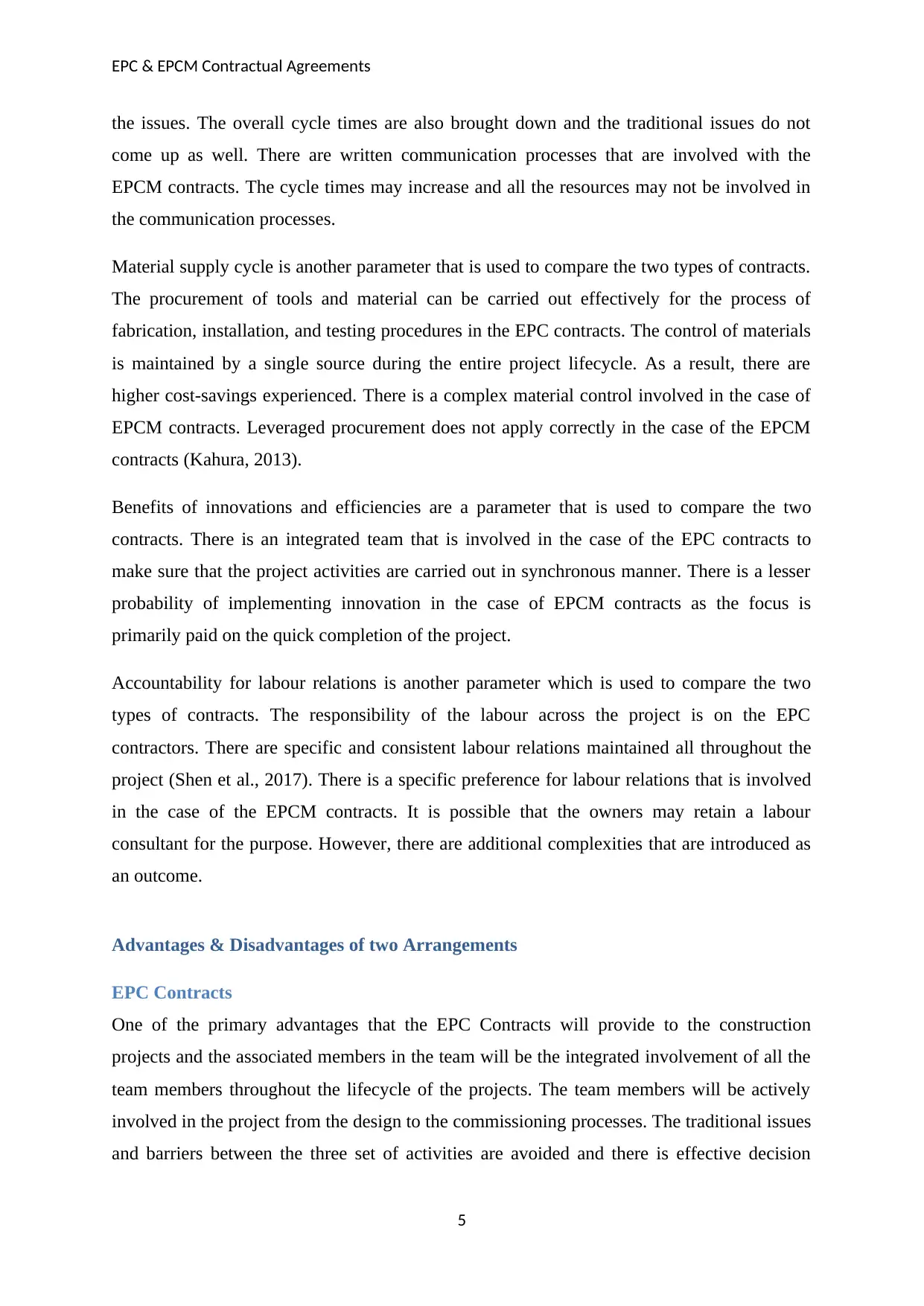
EPC & EPCM Contractual Agreements
the issues. The overall cycle times are also brought down and the traditional issues do not
come up as well. There are written communication processes that are involved with the
EPCM contracts. The cycle times may increase and all the resources may not be involved in
the communication processes.
Material supply cycle is another parameter that is used to compare the two types of contracts.
The procurement of tools and material can be carried out effectively for the process of
fabrication, installation, and testing procedures in the EPC contracts. The control of materials
is maintained by a single source during the entire project lifecycle. As a result, there are
higher cost-savings experienced. There is a complex material control involved in the case of
EPCM contracts. Leveraged procurement does not apply correctly in the case of the EPCM
contracts (Kahura, 2013).
Benefits of innovations and efficiencies are a parameter that is used to compare the two
contracts. There is an integrated team that is involved in the case of the EPC contracts to
make sure that the project activities are carried out in synchronous manner. There is a lesser
probability of implementing innovation in the case of EPCM contracts as the focus is
primarily paid on the quick completion of the project.
Accountability for labour relations is another parameter which is used to compare the two
types of contracts. The responsibility of the labour across the project is on the EPC
contractors. There are specific and consistent labour relations maintained all throughout the
project (Shen et al., 2017). There is a specific preference for labour relations that is involved
in the case of the EPCM contracts. It is possible that the owners may retain a labour
consultant for the purpose. However, there are additional complexities that are introduced as
an outcome.
Advantages & Disadvantages of two Arrangements
EPC Contracts
One of the primary advantages that the EPC Contracts will provide to the construction
projects and the associated members in the team will be the integrated involvement of all the
team members throughout the lifecycle of the projects. The team members will be actively
involved in the project from the design to the commissioning processes. The traditional issues
and barriers between the three set of activities are avoided and there is effective decision
5
the issues. The overall cycle times are also brought down and the traditional issues do not
come up as well. There are written communication processes that are involved with the
EPCM contracts. The cycle times may increase and all the resources may not be involved in
the communication processes.
Material supply cycle is another parameter that is used to compare the two types of contracts.
The procurement of tools and material can be carried out effectively for the process of
fabrication, installation, and testing procedures in the EPC contracts. The control of materials
is maintained by a single source during the entire project lifecycle. As a result, there are
higher cost-savings experienced. There is a complex material control involved in the case of
EPCM contracts. Leveraged procurement does not apply correctly in the case of the EPCM
contracts (Kahura, 2013).
Benefits of innovations and efficiencies are a parameter that is used to compare the two
contracts. There is an integrated team that is involved in the case of the EPC contracts to
make sure that the project activities are carried out in synchronous manner. There is a lesser
probability of implementing innovation in the case of EPCM contracts as the focus is
primarily paid on the quick completion of the project.
Accountability for labour relations is another parameter which is used to compare the two
types of contracts. The responsibility of the labour across the project is on the EPC
contractors. There are specific and consistent labour relations maintained all throughout the
project (Shen et al., 2017). There is a specific preference for labour relations that is involved
in the case of the EPCM contracts. It is possible that the owners may retain a labour
consultant for the purpose. However, there are additional complexities that are introduced as
an outcome.
Advantages & Disadvantages of two Arrangements
EPC Contracts
One of the primary advantages that the EPC Contracts will provide to the construction
projects and the associated members in the team will be the integrated involvement of all the
team members throughout the lifecycle of the projects. The team members will be actively
involved in the project from the design to the commissioning processes. The traditional issues
and barriers between the three set of activities are avoided and there is effective decision
5
⊘ This is a preview!⊘
Do you want full access?
Subscribe today to unlock all pages.

Trusted by 1+ million students worldwide
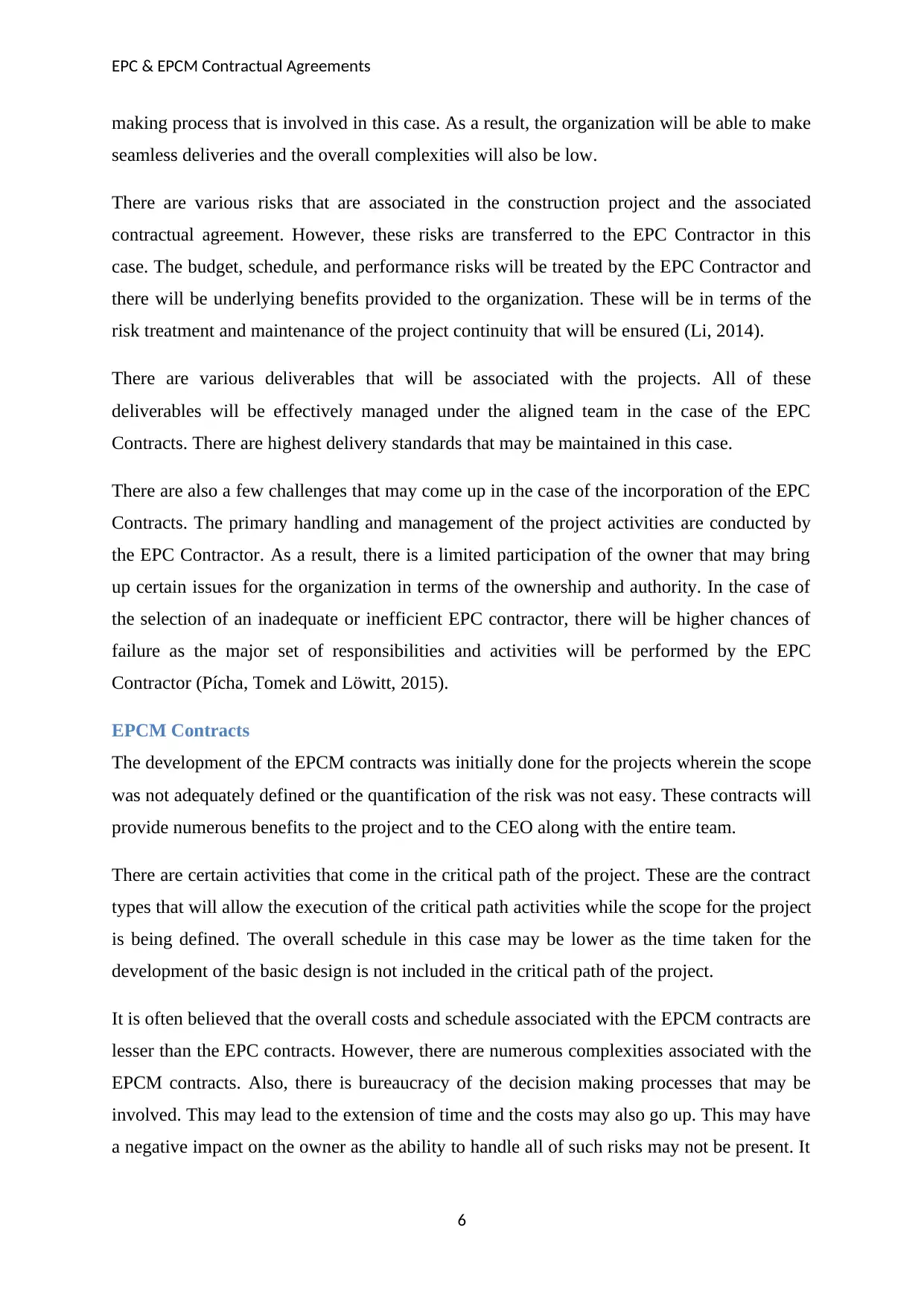
EPC & EPCM Contractual Agreements
making process that is involved in this case. As a result, the organization will be able to make
seamless deliveries and the overall complexities will also be low.
There are various risks that are associated in the construction project and the associated
contractual agreement. However, these risks are transferred to the EPC Contractor in this
case. The budget, schedule, and performance risks will be treated by the EPC Contractor and
there will be underlying benefits provided to the organization. These will be in terms of the
risk treatment and maintenance of the project continuity that will be ensured (Li, 2014).
There are various deliverables that will be associated with the projects. All of these
deliverables will be effectively managed under the aligned team in the case of the EPC
Contracts. There are highest delivery standards that may be maintained in this case.
There are also a few challenges that may come up in the case of the incorporation of the EPC
Contracts. The primary handling and management of the project activities are conducted by
the EPC Contractor. As a result, there is a limited participation of the owner that may bring
up certain issues for the organization in terms of the ownership and authority. In the case of
the selection of an inadequate or inefficient EPC contractor, there will be higher chances of
failure as the major set of responsibilities and activities will be performed by the EPC
Contractor (Pícha, Tomek and Löwitt, 2015).
EPCM Contracts
The development of the EPCM contracts was initially done for the projects wherein the scope
was not adequately defined or the quantification of the risk was not easy. These contracts will
provide numerous benefits to the project and to the CEO along with the entire team.
There are certain activities that come in the critical path of the project. These are the contract
types that will allow the execution of the critical path activities while the scope for the project
is being defined. The overall schedule in this case may be lower as the time taken for the
development of the basic design is not included in the critical path of the project.
It is often believed that the overall costs and schedule associated with the EPCM contracts are
lesser than the EPC contracts. However, there are numerous complexities associated with the
EPCM contracts. Also, there is bureaucracy of the decision making processes that may be
involved. This may lead to the extension of time and the costs may also go up. This may have
a negative impact on the owner as the ability to handle all of such risks may not be present. It
6
making process that is involved in this case. As a result, the organization will be able to make
seamless deliveries and the overall complexities will also be low.
There are various risks that are associated in the construction project and the associated
contractual agreement. However, these risks are transferred to the EPC Contractor in this
case. The budget, schedule, and performance risks will be treated by the EPC Contractor and
there will be underlying benefits provided to the organization. These will be in terms of the
risk treatment and maintenance of the project continuity that will be ensured (Li, 2014).
There are various deliverables that will be associated with the projects. All of these
deliverables will be effectively managed under the aligned team in the case of the EPC
Contracts. There are highest delivery standards that may be maintained in this case.
There are also a few challenges that may come up in the case of the incorporation of the EPC
Contracts. The primary handling and management of the project activities are conducted by
the EPC Contractor. As a result, there is a limited participation of the owner that may bring
up certain issues for the organization in terms of the ownership and authority. In the case of
the selection of an inadequate or inefficient EPC contractor, there will be higher chances of
failure as the major set of responsibilities and activities will be performed by the EPC
Contractor (Pícha, Tomek and Löwitt, 2015).
EPCM Contracts
The development of the EPCM contracts was initially done for the projects wherein the scope
was not adequately defined or the quantification of the risk was not easy. These contracts will
provide numerous benefits to the project and to the CEO along with the entire team.
There are certain activities that come in the critical path of the project. These are the contract
types that will allow the execution of the critical path activities while the scope for the project
is being defined. The overall schedule in this case may be lower as the time taken for the
development of the basic design is not included in the critical path of the project.
It is often believed that the overall costs and schedule associated with the EPCM contracts are
lesser than the EPC contracts. However, there are numerous complexities associated with the
EPCM contracts. Also, there is bureaucracy of the decision making processes that may be
involved. This may lead to the extension of time and the costs may also go up. This may have
a negative impact on the owner as the ability to handle all of such risks may not be present. It
6
Paraphrase This Document
Need a fresh take? Get an instant paraphrase of this document with our AI Paraphraser
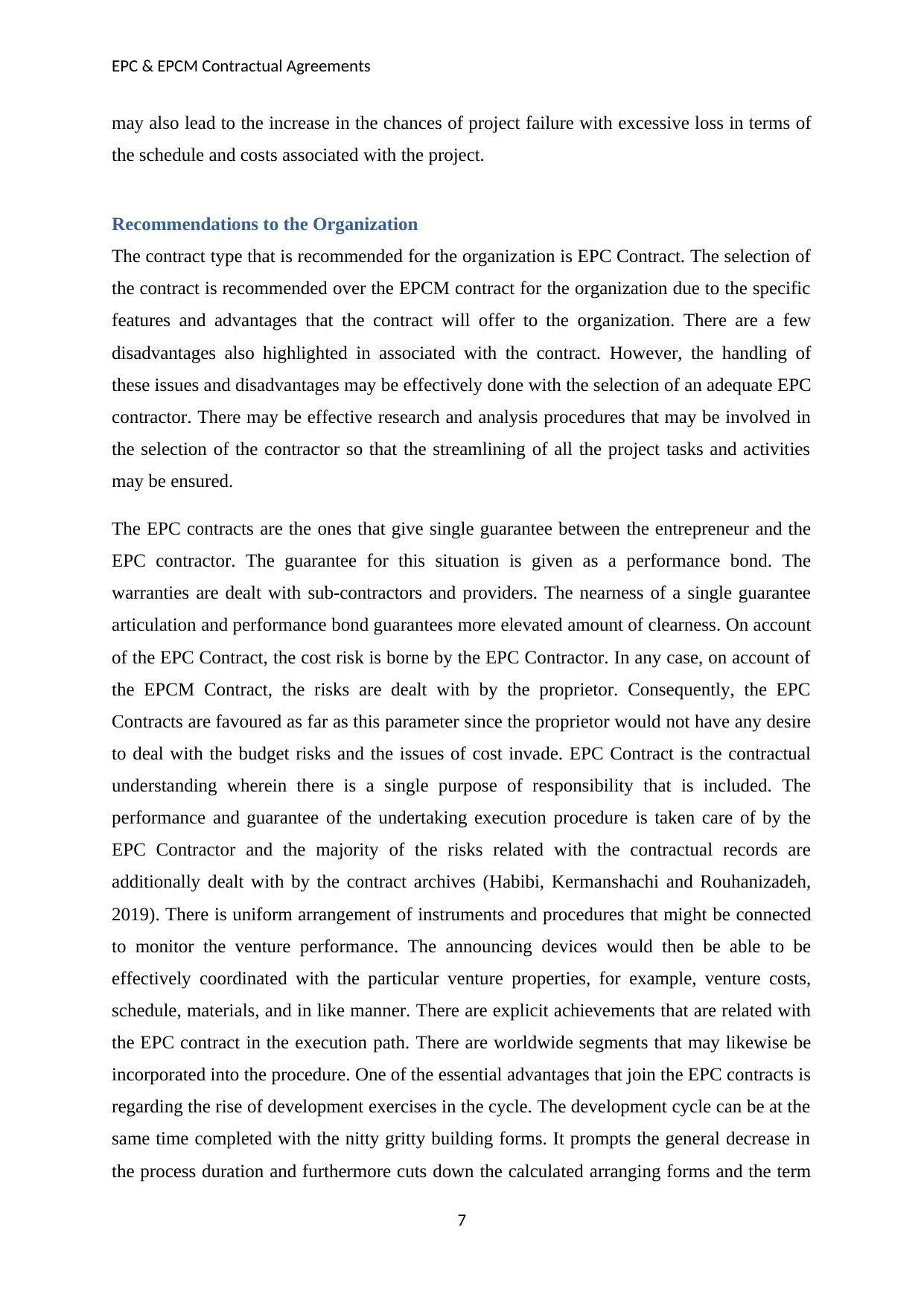
EPC & EPCM Contractual Agreements
may also lead to the increase in the chances of project failure with excessive loss in terms of
the schedule and costs associated with the project.
Recommendations to the Organization
The contract type that is recommended for the organization is EPC Contract. The selection of
the contract is recommended over the EPCM contract for the organization due to the specific
features and advantages that the contract will offer to the organization. There are a few
disadvantages also highlighted in associated with the contract. However, the handling of
these issues and disadvantages may be effectively done with the selection of an adequate EPC
contractor. There may be effective research and analysis procedures that may be involved in
the selection of the contractor so that the streamlining of all the project tasks and activities
may be ensured.
The EPC contracts are the ones that give single guarantee between the entrepreneur and the
EPC contractor. The guarantee for this situation is given as a performance bond. The
warranties are dealt with sub-contractors and providers. The nearness of a single guarantee
articulation and performance bond guarantees more elevated amount of clearness. On account
of the EPC Contract, the cost risk is borne by the EPC Contractor. In any case, on account of
the EPCM Contract, the risks are dealt with by the proprietor. Consequently, the EPC
Contracts are favoured as far as this parameter since the proprietor would not have any desire
to deal with the budget risks and the issues of cost invade. EPC Contract is the contractual
understanding wherein there is a single purpose of responsibility that is included. The
performance and guarantee of the undertaking execution procedure is taken care of by the
EPC Contractor and the majority of the risks related with the contractual records are
additionally dealt with by the contract archives (Habibi, Kermanshachi and Rouhanizadeh,
2019). There is uniform arrangement of instruments and procedures that might be connected
to monitor the venture performance. The announcing devices would then be able to be
effectively coordinated with the particular venture properties, for example, venture costs,
schedule, materials, and in like manner. There are explicit achievements that are related with
the EPC contract in the execution path. There are worldwide segments that may likewise be
incorporated into the procedure. One of the essential advantages that join the EPC contracts is
regarding the rise of development exercises in the cycle. The development cycle can be at the
same time completed with the nitty gritty building forms. It prompts the general decrease in
the process duration and furthermore cuts down the calculated arranging forms and the term
7
may also lead to the increase in the chances of project failure with excessive loss in terms of
the schedule and costs associated with the project.
Recommendations to the Organization
The contract type that is recommended for the organization is EPC Contract. The selection of
the contract is recommended over the EPCM contract for the organization due to the specific
features and advantages that the contract will offer to the organization. There are a few
disadvantages also highlighted in associated with the contract. However, the handling of
these issues and disadvantages may be effectively done with the selection of an adequate EPC
contractor. There may be effective research and analysis procedures that may be involved in
the selection of the contractor so that the streamlining of all the project tasks and activities
may be ensured.
The EPC contracts are the ones that give single guarantee between the entrepreneur and the
EPC contractor. The guarantee for this situation is given as a performance bond. The
warranties are dealt with sub-contractors and providers. The nearness of a single guarantee
articulation and performance bond guarantees more elevated amount of clearness. On account
of the EPC Contract, the cost risk is borne by the EPC Contractor. In any case, on account of
the EPCM Contract, the risks are dealt with by the proprietor. Consequently, the EPC
Contracts are favoured as far as this parameter since the proprietor would not have any desire
to deal with the budget risks and the issues of cost invade. EPC Contract is the contractual
understanding wherein there is a single purpose of responsibility that is included. The
performance and guarantee of the undertaking execution procedure is taken care of by the
EPC Contractor and the majority of the risks related with the contractual records are
additionally dealt with by the contract archives (Habibi, Kermanshachi and Rouhanizadeh,
2019). There is uniform arrangement of instruments and procedures that might be connected
to monitor the venture performance. The announcing devices would then be able to be
effectively coordinated with the particular venture properties, for example, venture costs,
schedule, materials, and in like manner. There are explicit achievements that are related with
the EPC contract in the execution path. There are worldwide segments that may likewise be
incorporated into the procedure. One of the essential advantages that join the EPC contracts is
regarding the rise of development exercises in the cycle. The development cycle can be at the
same time completed with the nitty gritty building forms. It prompts the general decrease in
the process duration and furthermore cuts down the calculated arranging forms and the term
7
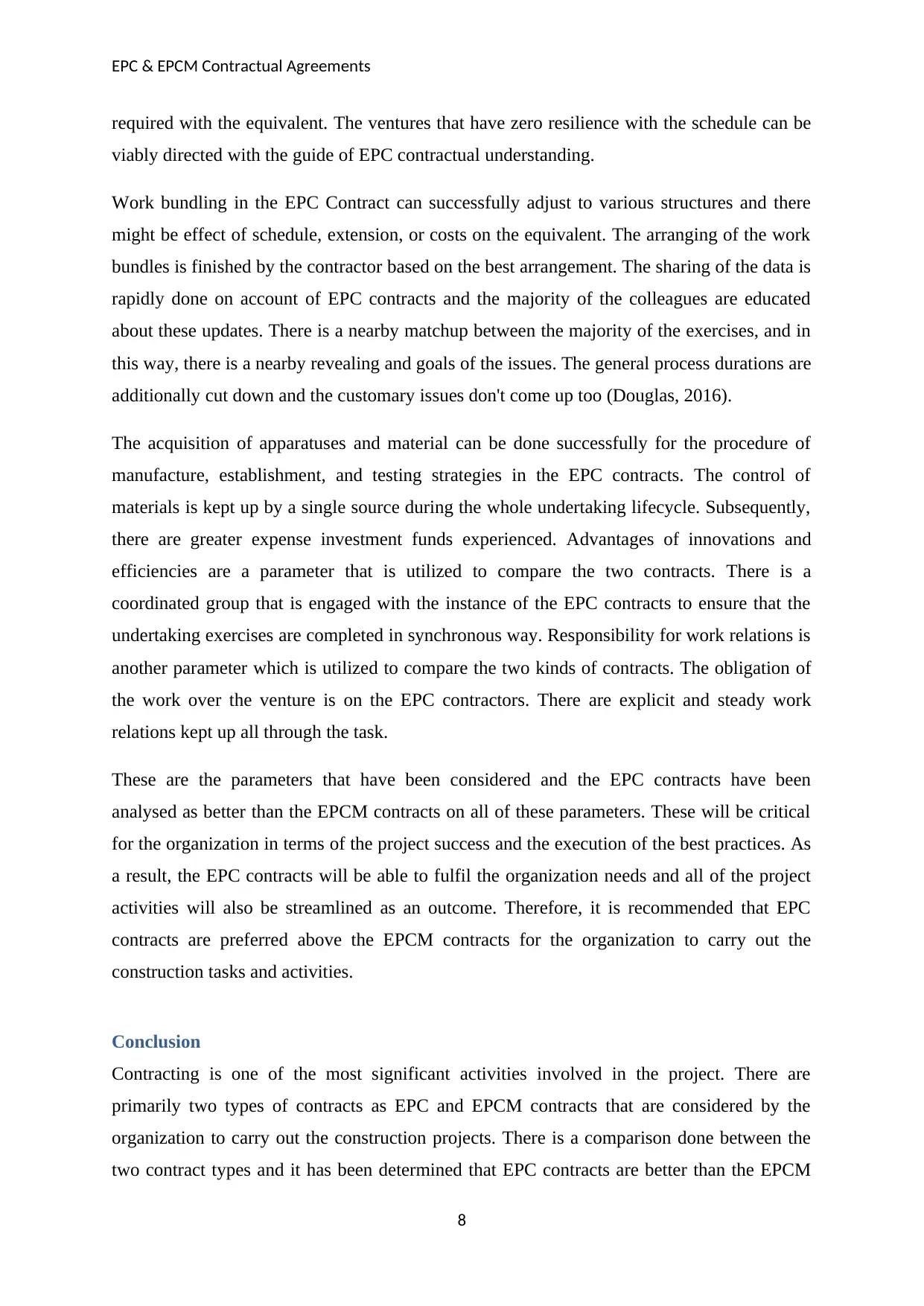
EPC & EPCM Contractual Agreements
required with the equivalent. The ventures that have zero resilience with the schedule can be
viably directed with the guide of EPC contractual understanding.
Work bundling in the EPC Contract can successfully adjust to various structures and there
might be effect of schedule, extension, or costs on the equivalent. The arranging of the work
bundles is finished by the contractor based on the best arrangement. The sharing of the data is
rapidly done on account of EPC contracts and the majority of the colleagues are educated
about these updates. There is a nearby matchup between the majority of the exercises, and in
this way, there is a nearby revealing and goals of the issues. The general process durations are
additionally cut down and the customary issues don't come up too (Douglas, 2016).
The acquisition of apparatuses and material can be done successfully for the procedure of
manufacture, establishment, and testing strategies in the EPC contracts. The control of
materials is kept up by a single source during the whole undertaking lifecycle. Subsequently,
there are greater expense investment funds experienced. Advantages of innovations and
efficiencies are a parameter that is utilized to compare the two contracts. There is a
coordinated group that is engaged with the instance of the EPC contracts to ensure that the
undertaking exercises are completed in synchronous way. Responsibility for work relations is
another parameter which is utilized to compare the two kinds of contracts. The obligation of
the work over the venture is on the EPC contractors. There are explicit and steady work
relations kept up all through the task.
These are the parameters that have been considered and the EPC contracts have been
analysed as better than the EPCM contracts on all of these parameters. These will be critical
for the organization in terms of the project success and the execution of the best practices. As
a result, the EPC contracts will be able to fulfil the organization needs and all of the project
activities will also be streamlined as an outcome. Therefore, it is recommended that EPC
contracts are preferred above the EPCM contracts for the organization to carry out the
construction tasks and activities.
Conclusion
Contracting is one of the most significant activities involved in the project. There are
primarily two types of contracts as EPC and EPCM contracts that are considered by the
organization to carry out the construction projects. There is a comparison done between the
two contract types and it has been determined that EPC contracts are better than the EPCM
8
required with the equivalent. The ventures that have zero resilience with the schedule can be
viably directed with the guide of EPC contractual understanding.
Work bundling in the EPC Contract can successfully adjust to various structures and there
might be effect of schedule, extension, or costs on the equivalent. The arranging of the work
bundles is finished by the contractor based on the best arrangement. The sharing of the data is
rapidly done on account of EPC contracts and the majority of the colleagues are educated
about these updates. There is a nearby matchup between the majority of the exercises, and in
this way, there is a nearby revealing and goals of the issues. The general process durations are
additionally cut down and the customary issues don't come up too (Douglas, 2016).
The acquisition of apparatuses and material can be done successfully for the procedure of
manufacture, establishment, and testing strategies in the EPC contracts. The control of
materials is kept up by a single source during the whole undertaking lifecycle. Subsequently,
there are greater expense investment funds experienced. Advantages of innovations and
efficiencies are a parameter that is utilized to compare the two contracts. There is a
coordinated group that is engaged with the instance of the EPC contracts to ensure that the
undertaking exercises are completed in synchronous way. Responsibility for work relations is
another parameter which is utilized to compare the two kinds of contracts. The obligation of
the work over the venture is on the EPC contractors. There are explicit and steady work
relations kept up all through the task.
These are the parameters that have been considered and the EPC contracts have been
analysed as better than the EPCM contracts on all of these parameters. These will be critical
for the organization in terms of the project success and the execution of the best practices. As
a result, the EPC contracts will be able to fulfil the organization needs and all of the project
activities will also be streamlined as an outcome. Therefore, it is recommended that EPC
contracts are preferred above the EPCM contracts for the organization to carry out the
construction tasks and activities.
Conclusion
Contracting is one of the most significant activities involved in the project. There are
primarily two types of contracts as EPC and EPCM contracts that are considered by the
organization to carry out the construction projects. There is a comparison done between the
two contract types and it has been determined that EPC contracts are better than the EPCM
8
⊘ This is a preview!⊘
Do you want full access?
Subscribe today to unlock all pages.

Trusted by 1+ million students worldwide

EPC & EPCM Contractual Agreements
contracts for the organization. This is because there are several benefits that are offered by
the EPC contracts over the EPCM contracts. There are certain challenges that may also be
associated with the EPC contracts in terms of the involvement of the owner and the selection
of an inadequate EPC contractor. However, such challenges may be resolved with the aid of
the adequate research and analysis processes.
9
contracts for the organization. This is because there are several benefits that are offered by
the EPC contracts over the EPCM contracts. There are certain challenges that may also be
associated with the EPC contracts in terms of the involvement of the owner and the selection
of an inadequate EPC contractor. However, such challenges may be resolved with the aid of
the adequate research and analysis processes.
9
Paraphrase This Document
Need a fresh take? Get an instant paraphrase of this document with our AI Paraphraser
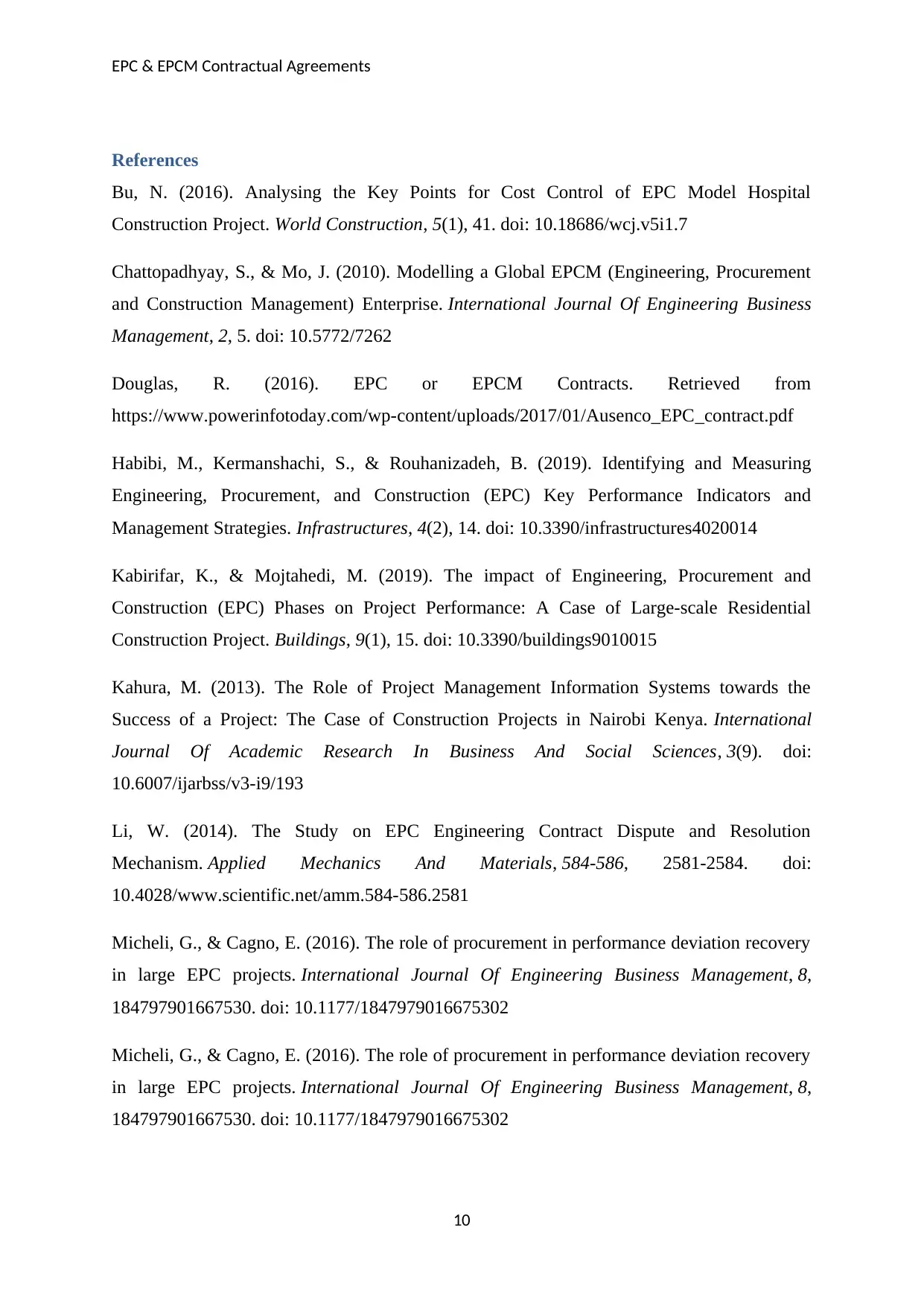
EPC & EPCM Contractual Agreements
References
Bu, N. (2016). Analysing the Key Points for Cost Control of EPC Model Hospital
Construction Project. World Construction, 5(1), 41. doi: 10.18686/wcj.v5i1.7
Chattopadhyay, S., & Mo, J. (2010). Modelling a Global EPCM (Engineering, Procurement
and Construction Management) Enterprise. International Journal Of Engineering Business
Management, 2, 5. doi: 10.5772/7262
Douglas, R. (2016). EPC or EPCM Contracts. Retrieved from
https://www.powerinfotoday.com/wp-content/uploads/2017/01/Ausenco_EPC_contract.pdf
Habibi, M., Kermanshachi, S., & Rouhanizadeh, B. (2019). Identifying and Measuring
Engineering, Procurement, and Construction (EPC) Key Performance Indicators and
Management Strategies. Infrastructures, 4(2), 14. doi: 10.3390/infrastructures4020014
Kabirifar, K., & Mojtahedi, M. (2019). The impact of Engineering, Procurement and
Construction (EPC) Phases on Project Performance: A Case of Large-scale Residential
Construction Project. Buildings, 9(1), 15. doi: 10.3390/buildings9010015
Kahura, M. (2013). The Role of Project Management Information Systems towards the
Success of a Project: The Case of Construction Projects in Nairobi Kenya. International
Journal Of Academic Research In Business And Social Sciences, 3(9). doi:
10.6007/ijarbss/v3-i9/193
Li, W. (2014). The Study on EPC Engineering Contract Dispute and Resolution
Mechanism. Applied Mechanics And Materials, 584-586, 2581-2584. doi:
10.4028/www.scientific.net/amm.584-586.2581
Micheli, G., & Cagno, E. (2016). The role of procurement in performance deviation recovery
in large EPC projects. International Journal Of Engineering Business Management, 8,
184797901667530. doi: 10.1177/1847979016675302
Micheli, G., & Cagno, E. (2016). The role of procurement in performance deviation recovery
in large EPC projects. International Journal Of Engineering Business Management, 8,
184797901667530. doi: 10.1177/1847979016675302
10
References
Bu, N. (2016). Analysing the Key Points for Cost Control of EPC Model Hospital
Construction Project. World Construction, 5(1), 41. doi: 10.18686/wcj.v5i1.7
Chattopadhyay, S., & Mo, J. (2010). Modelling a Global EPCM (Engineering, Procurement
and Construction Management) Enterprise. International Journal Of Engineering Business
Management, 2, 5. doi: 10.5772/7262
Douglas, R. (2016). EPC or EPCM Contracts. Retrieved from
https://www.powerinfotoday.com/wp-content/uploads/2017/01/Ausenco_EPC_contract.pdf
Habibi, M., Kermanshachi, S., & Rouhanizadeh, B. (2019). Identifying and Measuring
Engineering, Procurement, and Construction (EPC) Key Performance Indicators and
Management Strategies. Infrastructures, 4(2), 14. doi: 10.3390/infrastructures4020014
Kabirifar, K., & Mojtahedi, M. (2019). The impact of Engineering, Procurement and
Construction (EPC) Phases on Project Performance: A Case of Large-scale Residential
Construction Project. Buildings, 9(1), 15. doi: 10.3390/buildings9010015
Kahura, M. (2013). The Role of Project Management Information Systems towards the
Success of a Project: The Case of Construction Projects in Nairobi Kenya. International
Journal Of Academic Research In Business And Social Sciences, 3(9). doi:
10.6007/ijarbss/v3-i9/193
Li, W. (2014). The Study on EPC Engineering Contract Dispute and Resolution
Mechanism. Applied Mechanics And Materials, 584-586, 2581-2584. doi:
10.4028/www.scientific.net/amm.584-586.2581
Micheli, G., & Cagno, E. (2016). The role of procurement in performance deviation recovery
in large EPC projects. International Journal Of Engineering Business Management, 8,
184797901667530. doi: 10.1177/1847979016675302
Micheli, G., & Cagno, E. (2016). The role of procurement in performance deviation recovery
in large EPC projects. International Journal Of Engineering Business Management, 8,
184797901667530. doi: 10.1177/1847979016675302
10
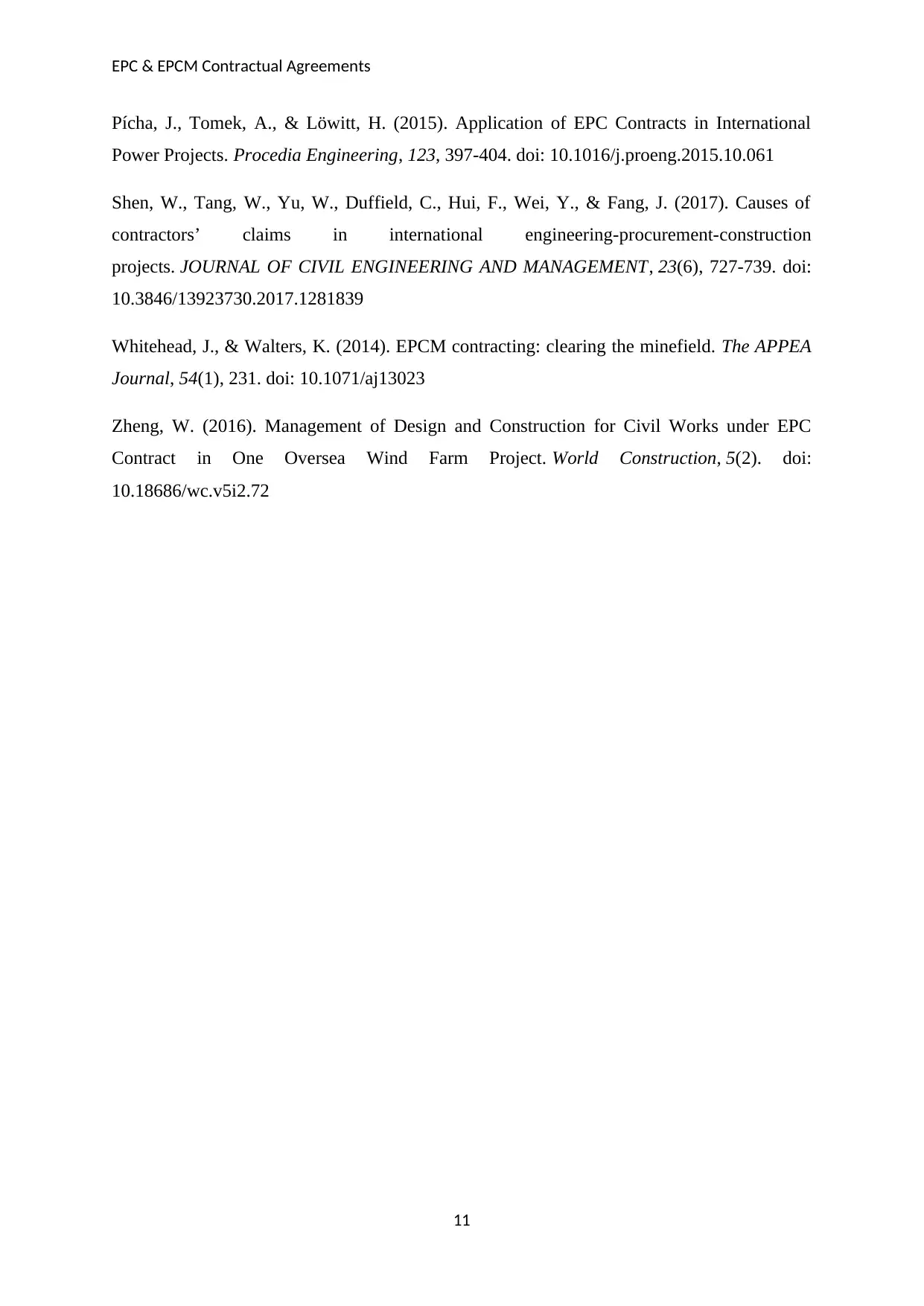
EPC & EPCM Contractual Agreements
Pícha, J., Tomek, A., & Löwitt, H. (2015). Application of EPC Contracts in International
Power Projects. Procedia Engineering, 123, 397-404. doi: 10.1016/j.proeng.2015.10.061
Shen, W., Tang, W., Yu, W., Duffield, C., Hui, F., Wei, Y., & Fang, J. (2017). Causes of
contractors’ claims in international engineering-procurement-construction
projects. JOURNAL OF CIVIL ENGINEERING AND MANAGEMENT, 23(6), 727-739. doi:
10.3846/13923730.2017.1281839
Whitehead, J., & Walters, K. (2014). EPCM contracting: clearing the minefield. The APPEA
Journal, 54(1), 231. doi: 10.1071/aj13023
Zheng, W. (2016). Management of Design and Construction for Civil Works under EPC
Contract in One Oversea Wind Farm Project. World Construction, 5(2). doi:
10.18686/wc.v5i2.72
11
Pícha, J., Tomek, A., & Löwitt, H. (2015). Application of EPC Contracts in International
Power Projects. Procedia Engineering, 123, 397-404. doi: 10.1016/j.proeng.2015.10.061
Shen, W., Tang, W., Yu, W., Duffield, C., Hui, F., Wei, Y., & Fang, J. (2017). Causes of
contractors’ claims in international engineering-procurement-construction
projects. JOURNAL OF CIVIL ENGINEERING AND MANAGEMENT, 23(6), 727-739. doi:
10.3846/13923730.2017.1281839
Whitehead, J., & Walters, K. (2014). EPCM contracting: clearing the minefield. The APPEA
Journal, 54(1), 231. doi: 10.1071/aj13023
Zheng, W. (2016). Management of Design and Construction for Civil Works under EPC
Contract in One Oversea Wind Farm Project. World Construction, 5(2). doi:
10.18686/wc.v5i2.72
11
⊘ This is a preview!⊘
Do you want full access?
Subscribe today to unlock all pages.

Trusted by 1+ million students worldwide
1 out of 12
Related Documents
Your All-in-One AI-Powered Toolkit for Academic Success.
+13062052269
info@desklib.com
Available 24*7 on WhatsApp / Email
![[object Object]](/_next/static/media/star-bottom.7253800d.svg)
Unlock your academic potential
Copyright © 2020–2025 A2Z Services. All Rights Reserved. Developed and managed by ZUCOL.





